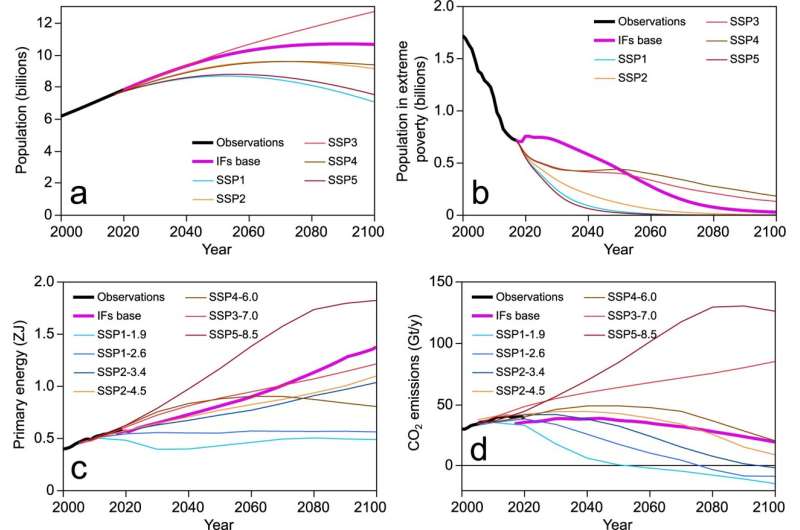
Population, extreme poverty, energy demand, and CO2 emissions. Credit: Communications Earth & Environment (2023). DOI: 10.1038/s43247-023-00874-7
The global economy will grow slower in the 21st century than economists have expected, a finding that has implications for our ability to adapt to climate change in the coming decades, according to new research.
A new study projecting the economic futures of four income groups of countries over the next century finds growth will be slower than predicted, with developing countries taking longer to close the wealth gap and approach the income of wealthier nations. What economists have thought of as a worst-case scenario for global economic growth may, in fact, be a best-case scenario, according to the new study published today in Communications Earth & Environment.
The findings suggest governments need to start planning for slower growth and wealthier countries may need to help lower-income nations finance climate change adaptations in the coming decades, according to the study authors.
“We’re at a point where we maybe need to significantly increase financing for [climate] adaptation in developing countries, and we’re also at a point where we might be overestimating our future ability to provide that financing under the current fiscal paradigm,” said Matt Burgess, a CIRES fellow, director of the Center for Social and Environmental Futures, and assistant professor of environmental studies at CU Boulder who led the new study.
“We can now start to winnow down the range of possibilities and move forward in more tangible ways,” said Ryan Langendorf, a postdoctoral scholar at CU Boulder and co-author of the new study.
In the new study, Burgess and his colleagues used two economic models to project how much the global economy will grow over the next century and how quickly developing countries will approach the income levels of wealthier nations.
Both models found the global economy will continue to grow, but that growth will be slower than most economists expected and there will be a larger income gap between wealthier and poorer nations. This means richer countries may need to help finance climate adaptations for poorer countries, and debt-ceiling crises, like what the United States experienced this spring, may become more common.
“Slower growth than we think means higher deficits than we expect, all else equal,” Burgess said. “That means debt would likely become more contentious and important over time, and could mean more frequent debt-ceiling fights.”
Similar to a flight emergency, where individuals should put their own oxygen masks on first, wealthier nations should focus on getting their own financial houses in order so they can be in a position to support lower-income nations in financing climate adaptations, according to the researchers.
“We’re talking about relatively less growth, relatively more inequality, but we’re still talking about a world that is richer than today and more equal across countries than today’s world,” Burgess said.
Still, many wealthy nations are accustomed to growing their way out of debt, but that may not be possible under the new scenario, according to Ashley Dancer, a graduate student at CU Boulder and co-author of the study.
“The next question is: what are some ways that we should be or could be helping [lower-income countries] adapt, if the expectation is that they’re not going to meet the level of wealth that would allow them to do that quickly and aggressively?” Dancer said.
More information:
Matthew G. Burgess et al, Multidecadal dynamics project slow 21st-century economic growth and income convergence, Communications Earth & Environment (2023). DOI: 10.1038/s43247-023-00874-7
Citation:
Study suggests 21st century economic growth will be slower than expected (2023, June 23)
retrieved 25 June 2023
from https://phys.org/news/2023-06-21st-century-economic-growth-slower.html
This document is subject to copyright. Apart from any fair dealing for the purpose of private study or research, no
part may be reproduced without the written permission. The content is provided for information purposes only.
>>> Read full article>>>
Copyright for syndicated content belongs to the linked Source : Phys.org – https://phys.org/news/2023-06-21st-century-economic-growth-slower.html
